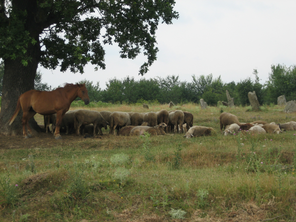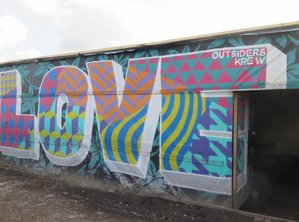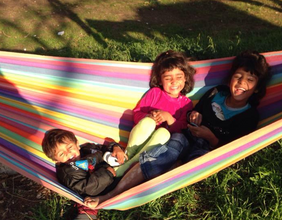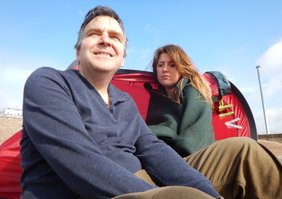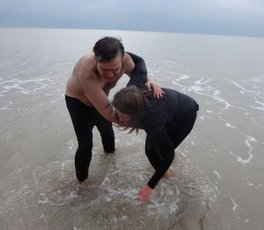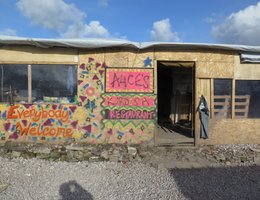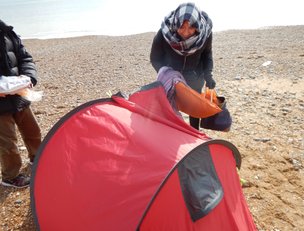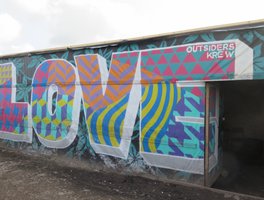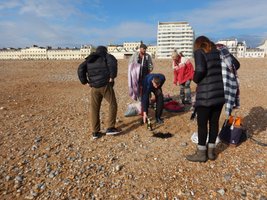Morphe
GrassmarketProjected
TAKE a look at Humanistan, the journey and awarded film 'Limboland', produced by Lars von Trier.
Jeremy Weller made a film that won the Danish film prize, which asks the question of what will happen to transiting refugees, in limbo unable to truly become a part of Danish life. Their integration is what society strives for, from Syrians in Turkey, Lebanon, to Scotland, but there are signs that some of those won't be approached and so may become alienated. Of kindness, Jack Kerouac writes: 'if we are kind all day every day we will realise we are already in Heaven.'
Listening to Mo, who faces the camera in the final scene of 'Limboland' and confronts the director and camerman, sensing his hugely vulnerable soul exposed, he hurls abuse at the crew for the unkindness he feels, as though it pursues him; for when the camera shuts down, he will be once more excluded and his heartbreaking devastation will follow. In a central scene one of the assistants asked if she can justify really continue conducting interviews, talking with foreigners, when she witnessed an Iraqi boy, Safaa, who says he will kill his sister if she dates a boy from a Danish background...he is unable to cope in fact with the fact that his own mother was beaten, by those who were indifferent to her and that her own mother was killed by her brother for being immoral in his opinion.
Rather than engage him, or question Safaa, on what has led him to such a vile take on women and likely will lead him violently astray, the woman wishes to lay the blame at the feet of director, Jeremy, as being a facist, for letting him express himself.
Fortunately for the film's sake and its ultimate succes, Jeremy asks how she knows for sure if what he threatens is what is really inside him. The many years of work with homeless, young offenders, drug addicted or alcoholic, has given him a broad perspective on two points:
1. What is said in a moment of grief and despair might sound passionate and honest, but can actually cloud over the real person's character. In other words a victim of circumstance and limited education, or poverty can appear fatalistic, unruly and isolated from any moral code or ability to grow.
2. The person may actually grow enormously into a new direction by the injection of an empathetic person, who reaches out to ask if there is not in fact a higher moral code that the victim...given half a chance, as the superficially unruly, aggressive, irrationally offensive person is, might actually apply to themselves.
By sitting, in the next scene, next to Safaa in a sequence entitled 'Safaa's Journey', she, holding his hand, literally breaks the appalling isolation he is suffering, and brings him round to find a more positive outlook. The astonishing about turn has a catalytic effect on her, no longer hating him. Likewise henow finds himself enabled to extend a helping hand to an African refugee, Thelma, who he sees equally in trouble.
'Humanistan' by Julia and Chris at the Shop Front Theatre, Coventry is a two year project which has followed on from earlier Grassmarket Project collaborations as much as 'Are we where we are?' the title of a two year project involving nine plays at Shop Front Theatre, Coventry with 'Choke', by Chris o'Connell, as its centre piece. The question of where we want to be compared to where we are could not be more relevant just now. It is one thesis that as Ray Brooks, the lead in Ken Loach's 'Cathy Come Home' put it, only kind people can make a sincere progress in the arts.
Precedents for Grassmarket Projects' model and success.
The homeless who call themselves the Rats..www.ratten.de have been a presence in East Berlin, where the Volksbuehne spent well over a million pounds on continuing a theatre project to protect and enhance the lives of those left in the street.
As such, Professor Schumacher from Leipzig, who attended the first play, the Plague, after Camus, hailed the project, as 'fulfilling Brecht's theatrical intentions.' Paris has also continued experiments with homeless after 'Glad to be Alive'
was invited to Pompidou, an appropriate stage, as George Pompidou wished art to be available to all classes. The work of Grassmarket Projects has projected a long shadow, from Sarah Kane's initial change of heart that led her in her own words 'to know what she wanted to do' in theatre, inspired by what she saw in 1991, 'Mad,' at Edinburgh Festival. The play involved women who had had mental breakdowns who nonetheless wished to tell their stories and grow.
Since it has also gone on to encourage workers from the NHS, seeing as one doctor describes his lifelong duty, not as trauma, but as a privilege, as poetry and makes the audience leave on a unique, induputable high.
Whatever people have felt, uncared for, or not sufficiently attentively helped, Jeremy has continued to passsionately strive to expose their lives. Ruthless honesty has led to self doubt and so increasing need for atonement, but cleverly, rather than see the failure to change the lives of all participants, or the audiences watching, it has sought to reach out to those others as described above fall short of reaching.
Palestinians once found safe haven in Syria, which is now no longer a safe place and 'Owltime' went to Calais, Jungle. ( Photos below )
Research of migrants from Syria conveys how rural life collapsed in drought, in the years before the uprising, forcing many to head for cities and then flee, in a story often politicised, when it was in fact like a bibilical nightmare of old. Many from rural lives had no wish to ever leave, but failing crops catalysed migration to overburdened cities, erupting in hunger and spiralling into conflict. Simplistic reporting rarely portrays this reality.
Below are photos of children in Calais, Jungle and graffiti.
